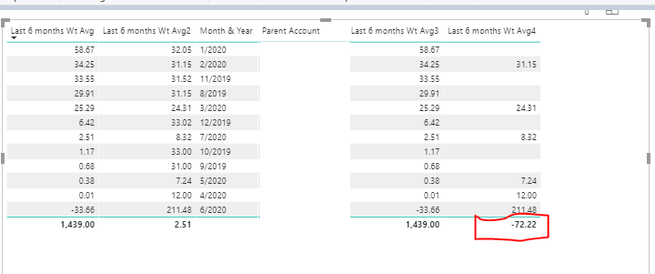- Power BI forums
- Updates
- News & Announcements
- Get Help with Power BI
- Desktop
- Service
- Report Server
- Power Query
- Mobile Apps
- Developer
- DAX Commands and Tips
- Custom Visuals Development Discussion
- Health and Life Sciences
- Power BI Spanish forums
- Translated Spanish Desktop
- Power Platform Integration - Better Together!
- Power Platform Integrations (Read-only)
- Power Platform and Dynamics 365 Integrations (Read-only)
- Training and Consulting
- Instructor Led Training
- Dashboard in a Day for Women, by Women
- Galleries
- Community Connections & How-To Videos
- COVID-19 Data Stories Gallery
- Themes Gallery
- Data Stories Gallery
- R Script Showcase
- Webinars and Video Gallery
- Quick Measures Gallery
- 2021 MSBizAppsSummit Gallery
- 2020 MSBizAppsSummit Gallery
- 2019 MSBizAppsSummit Gallery
- Events
- Ideas
- Custom Visuals Ideas
- Issues
- Issues
- Events
- Upcoming Events
- Community Blog
- Power BI Community Blog
- Custom Visuals Community Blog
- Community Support
- Community Accounts & Registration
- Using the Community
- Community Feedback
Register now to learn Fabric in free live sessions led by the best Microsoft experts. From Apr 16 to May 9, in English and Spanish.
- Power BI forums
- Forums
- Get Help with Power BI
- DAX Commands and Tips
- Last 6 month weighted average total is inaccurate
- Subscribe to RSS Feed
- Mark Topic as New
- Mark Topic as Read
- Float this Topic for Current User
- Bookmark
- Subscribe
- Printer Friendly Page
- Mark as New
- Bookmark
- Subscribe
- Mute
- Subscribe to RSS Feed
- Permalink
- Report Inappropriate Content
Last 6 month weighted average total is inaccurate
I tried to create a measure of last 6 month weighted average days, the measure is as follows;
Wt avg 2 = CALCULATE(SUMX(RECEIVABLES,RECEIVABLES[Days Diff]*RECEIVABLES[Weights]))

Solved! Go to Solution.
- Mark as New
- Bookmark
- Subscribe
- Mute
- Subscribe to RSS Feed
- Permalink
- Report Inappropriate Content
You haven't provided enough information for me to give you an exact answer, but these issues are always of the category I call "totals don't add up". You can read more about that here https://exceleratorbi.com.au/use-sum-vs-sumx/
Your visual (rows inside) is doing the calc for individual "month & year", but your total does not do that. The total is for all months and years (which is not the same as doing it by month and year, then averaging them). It's not clear to me if you need the SUMX or not, nor which table the "month & year" column comes from. But you will need some way of averaging the results by month at the total. A guess is it will be something like this (one option)
Last 6 months Wt Avg4 =
VAR enddate =
EOMONTH ( 'LAST REFRESHED'[Data Last Refreshed], -1 )
VAR startdate =
EOMONTH ( enddate, -6 ) + 1
RETURN
CALCULATE (
Averagex(values(table[month & year]),[Wt avg 2]),
FILTER (
'RECEIVABLES',
'RECEIVABLES'[Payment Recieved date] >= startdate
&& RECEIVABLES[Payment Recieved date] <= enddate
)
)It is likely there is a more efficient way to do it, but you would need to share the entire data model for that to be clear.
- Mark as New
- Bookmark
- Subscribe
- Mute
- Subscribe to RSS Feed
- Permalink
- Report Inappropriate Content
- Mark as New
- Bookmark
- Subscribe
- Mute
- Subscribe to RSS Feed
- Permalink
- Report Inappropriate Content
You haven't provided enough information for me to give you an exact answer, but these issues are always of the category I call "totals don't add up". You can read more about that here https://exceleratorbi.com.au/use-sum-vs-sumx/
Your visual (rows inside) is doing the calc for individual "month & year", but your total does not do that. The total is for all months and years (which is not the same as doing it by month and year, then averaging them). It's not clear to me if you need the SUMX or not, nor which table the "month & year" column comes from. But you will need some way of averaging the results by month at the total. A guess is it will be something like this (one option)
Last 6 months Wt Avg4 =
VAR enddate =
EOMONTH ( 'LAST REFRESHED'[Data Last Refreshed], -1 )
VAR startdate =
EOMONTH ( enddate, -6 ) + 1
RETURN
CALCULATE (
Averagex(values(table[month & year]),[Wt avg 2]),
FILTER (
'RECEIVABLES',
'RECEIVABLES'[Payment Recieved date] >= startdate
&& RECEIVABLES[Payment Recieved date] <= enddate
)
)It is likely there is a more efficient way to do it, but you would need to share the entire data model for that to be clear.
Helpful resources

Microsoft Fabric Learn Together
Covering the world! 9:00-10:30 AM Sydney, 4:00-5:30 PM CET (Paris/Berlin), 7:00-8:30 PM Mexico City

Power BI Monthly Update - April 2024
Check out the April 2024 Power BI update to learn about new features.

| User | Count |
|---|---|
| 40 | |
| 20 | |
| 18 | |
| 16 | |
| 15 |
| User | Count |
|---|---|
| 50 | |
| 26 | |
| 21 | |
| 17 | |
| 16 |
